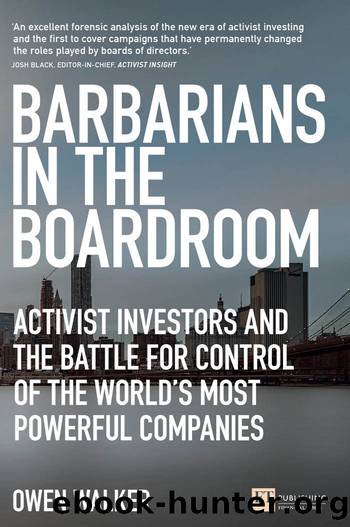Barbarians in the Boardroom: Activist Investors and the Battle for Control of the World's Most Powerful Companies by Owen Walker

Author:Owen Walker [Walker, Owen]
Language: eng
Format: epub
ISBN: 9781292114019
Google: ditjDAAAQBAJ
Published: 2016-07-04T12:05:45+00:00
Alternative plan
Earlier that year, in the weeks before Trianâs investment was known, DuPont had announced that it was considering âstrategic alternativesâ for its specialist chemicals unit. On 24 October 2013, Ellen Kullman revealed that the DuPont plan was to spin off the chemicals unit into a new publicly traded company, which would be owned by DuPont shareholders. The new company would be focused on making pigments â which turn paint, plastics and paper white â refrigerants and other chemicals, like non-stick coatings and Kevlar, a material used in armour. The chemicals unit had accounted for just under a third of DuPontâs $6.3 billion of operating earnings the year before. The spin-off would be complete by mid-2015, Kullman said.
The following day, on 25 October, Kullman called Ed Garden to tell him that the board had considered his proposal of splitting the company into four, but it had rejected it. They had also decided against accepting a Trian nominee onto the board. The plan to spin off the chemicals unit had allowed DuPont to provide an answer to those shareholders that wanted to see a more rigorous shake-up of the company, while also blunting Trianâs advances.
But Trian would not be put off so easily. A week later, Kullman received a phone call from one of DuPontâs biggest investors, the California State Teachersâ Retirement System (Calstrs). The second-largest US public pension fund was also a significant backer of Trian and was close to its management team. Calstrs had a strong incentive to make sure DuPont and Trian could reconcile their differences. Calstrs asked Kullman to meet once more with Trian to see if they could find some common ground.
This was not Calstrsâ first intervention. Before Trianâs investment in DuPont was public knowledge, two of the pension fundâs representatives â its head of corporate governance, Anne Sheehan, and Aeisha Mastagni, a corporate governance portfolio manager â had attended a meeting between Kullman and Trian that also included DuPontâs lead director, Sandy Cutler. Calstrs had had concerns about DuPontâs performance for a while and also suspected the board were not doing enough to hold Kullman and her management team accountable for it.
âWe wanted to be part of the meeting because we wanted to show our support for Trian,â recalls Mastagni. âBut we also wanted to hear first-hand from DuPont â and especially Sandy Cutler â what his views were on Trianâs proposal and thesis.â
Calstrs and Trian had developed a close relationship over the years, with the pension fund supporting Trian in its campaigns against Heinz and Ingersoll-Rand. In both campaigns Trian managed to get board representation and, at the latter, had pushed the company to restructure some of its businesses. These were ominous signs for DuPont.
After the nudge from Calstrs, a meeting was arranged at the Washington, DC, office of DuPontâs lawyers, Skadden Arps. On 10 December 2013, Kullman and Cutler met Trianâs Ed Garden. The two sides had not spoken since Kullman had told Garden that the board had rejected Trianâs proposal to split the company in four and refused its request for a board seat.
Download
This site does not store any files on its server. We only index and link to content provided by other sites. Please contact the content providers to delete copyright contents if any and email us, we'll remove relevant links or contents immediately.
The Black Swan by Nassim Nicholas Taleb(7088)
Bad Blood by John Carreyrou(6601)
Pioneering Portfolio Management by David F. Swensen(6275)
Millionaire: The Philanderer, Gambler, and Duelist Who Invented Modern Finance by Janet Gleeson(4448)
Skin in the Game by Nassim Nicholas Taleb(4224)
The Money Culture by Michael Lewis(4174)
Bullshit Jobs by David Graeber(4162)
Skin in the Game: Hidden Asymmetries in Daily Life by Nassim Nicholas Taleb(3977)
The Wisdom of Finance by Mihir Desai(3720)
Blockchain Basics by Daniel Drescher(3566)
Liar's Poker by Michael Lewis(3433)
Fooled by Randomness: The Hidden Role of Chance in Life and in the Markets by Nassim Nicholas Taleb(3094)
Hands-On Machine Learning for Algorithmic Trading by Stefan Jansen(3062)
The Intelligent Investor by Benjamin Graham Jason Zweig(3031)
Mastering Bitcoin: Programming the Open Blockchain by Andreas M. Antonopoulos(3029)
The Power of Broke by Daymond John(2953)
Investing For Dummies by Eric Tyson(2935)
You Are What You Risk by Michele Wucker(2688)
Market Wizards by Jack D. Schwager(2685)
